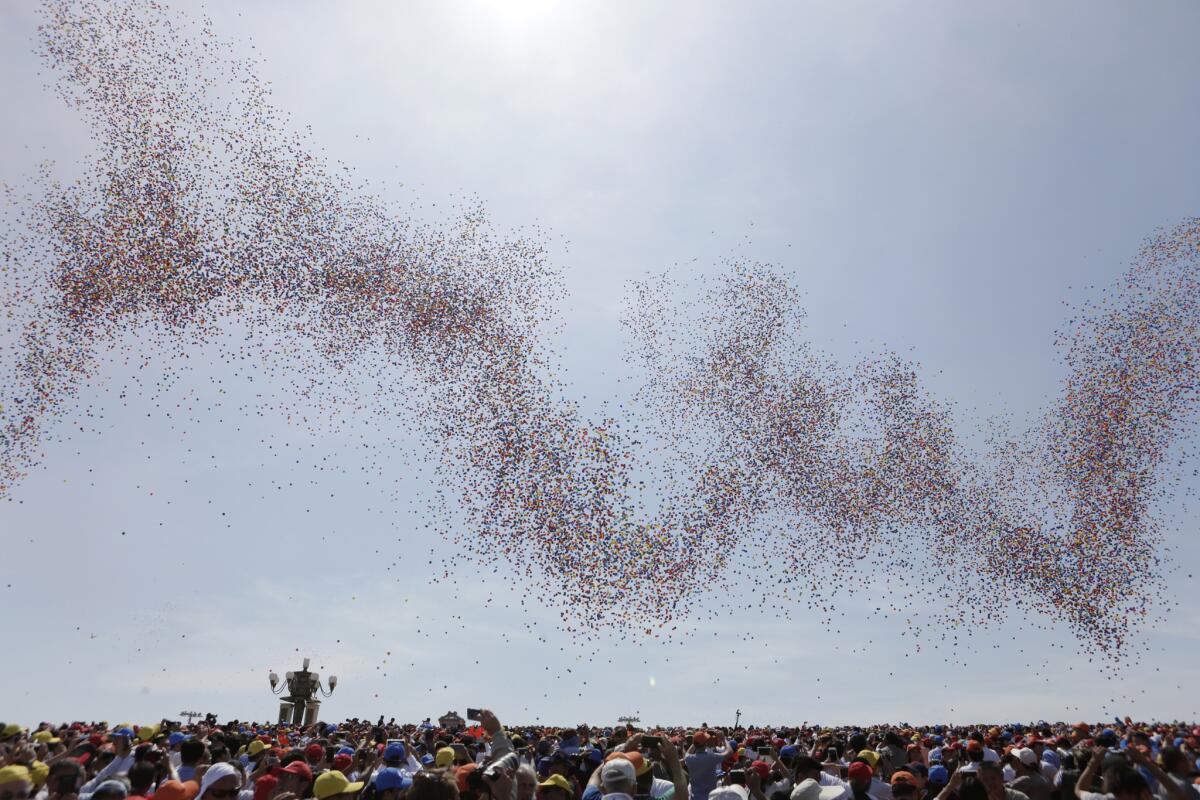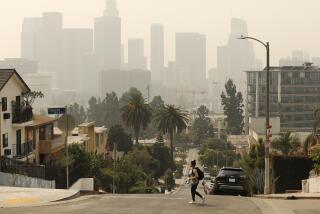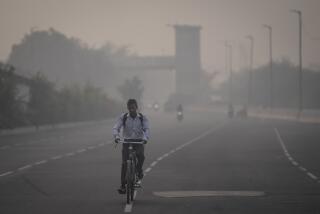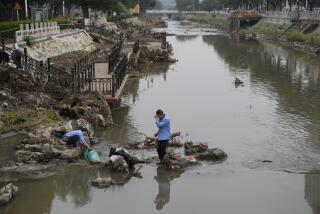After ‘military parade blue’ skies, pollution returns to Beijing

Balloons fill the clear skies over Beijing on Sept. 3 during a military parade marking the 70th anniversary of the end of World War II.
It was as if somebody had flipped a switch.
In the two-week run-up to a military parade in Beijing on Thursday — a massive spectacle to mark the 70th anniversary of Japan’s defeat in World War II — the Chinese capital’s notoriously polluted sky was an azure blue. Then on Friday morning, less than 24 hours later, a blanket of noxious smog once again covered the city, leaving many residents puzzled over how it had come back so fast.
On Monday, the government gave an explanation.
According to a Monday morning report in the state-run Beijing Times, officials cleaned up Beijing’s air in advance of the parade by suspending or restricting the operations of 12,255 coal-burning boilers, factories and cement-mixing stations scattered among seven provinces. About 5,700 of the enterprises were in Beijing and in Hebei province, which surrounds the city.
Aside from closing factories, authorities restricted the city’s 5 million registered cars to driving on every other day. The measures began in late August and precipitated a 15-day run of relatively clean air.
On the day of the parade, the city’s air quality index, a widely accepted gauge of air quality, clocked in at a healthy 17 out of 500. The day after, it hit 160 in parts of the city — levels at which “everyone may begin to experience some adverse health effects,” according to the U.S. Environmental Protection Agency.
The controls had eased at midnight after the parade.
Last autumn, when Beijing hosted the Asia-Pacific Economic Cooperation summit, a high-profile political gathering, authorities enacted similar measures. The effort led Internet users to coin the term “APEC blue” — meaning something wonderful but fleeting.
According to the Beijing Times, the government’s efforts to ensure a stretch of “military parade blue” were 15 times more extensive than those for the APEC summit.
In the two weeks preceding the parade, levels of PM 2.5, fine particulate matter considered highly dangerous to human health, were the lowest the city had on record, Zhang Dawei, head of the Beijing Municipal Environmental Monitoring Center, told the Beijing Times.
“This is unprecedented in the history of PM 2.5 monitoring in Beijing,” Zhang said. He added that between Aug. 20 and Sept. 3, Beijing’s average levels of PM 2.5 were 73.2% lower than the same period in 2014.
NEWSLETTER: Get the day’s top headlines from Times Editor Davan Maharaj >>
“It was as good as the annual index in some metropolises in developed countries, such as Paris, London, Moscow and Singapore,” he said.
Many Chinese Internet users on Monday seemed less than thrilled by the idea that authorities will clean up the city’s skies only for major international events.
“The Military Parade Blue went away in a snap — it feels like such a mystery, like making magic,” wrote one user on Sina Weibo, the country’s most popular microblog.
“Military Parade Blue is gone; in its place is our ‘Normal Status Gray,’ wrote another. “Residents in Beijing will start cursing again. Do we want development? Or do we want the environment? This all shows that the pollution is caused by human activities, and that it’s possible to control.”
“May I ask, is the Military Parade Blue a result of human control?” wrote a third. “Can we control it for a few more days? Can we also control when it snows and when it rains? Can we also control the weather?”
Tommy Yang in The Times’ Beijing bureau contributed to this report.
Follow @JRKaiman on Twitter for news out of Asia.
ALSO
Germany’s open-door policy in migrant crisis casts nation in a new light
U.K. forces kill British militants in Syria airstrikes, Cameron tells Parliament
Who will face comedian in Guatemalan presidential runoff? It’s too close to call
More to Read
Start your day right
Sign up for Essential California for news, features and recommendations from the L.A. Times and beyond in your inbox six days a week.
You may occasionally receive promotional content from the Los Angeles Times.






